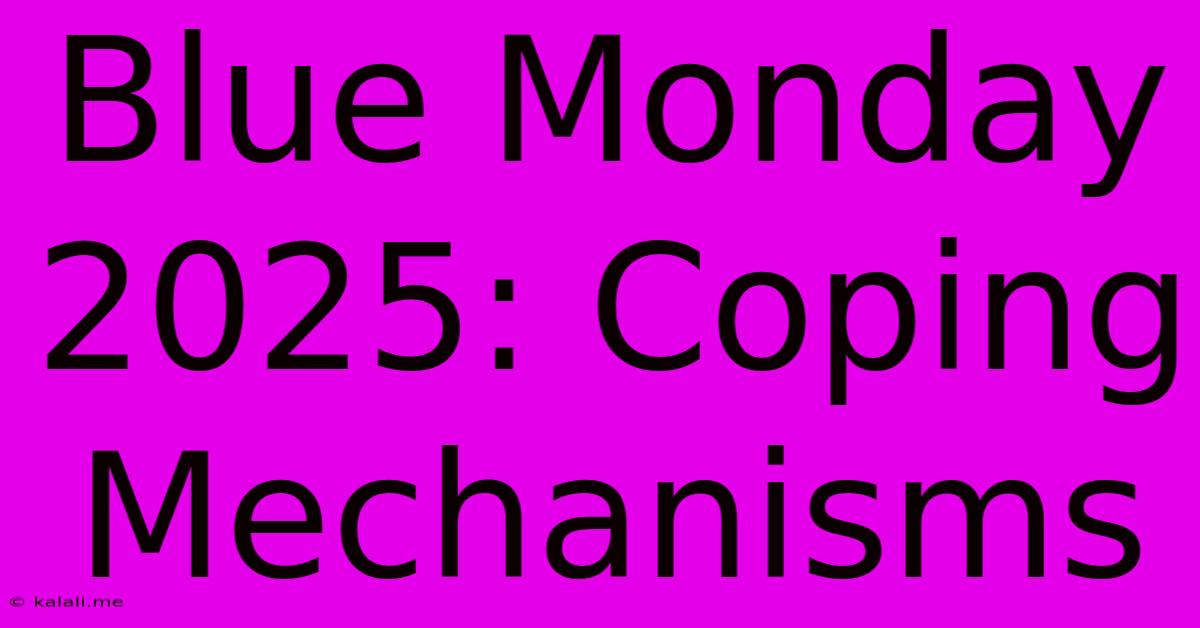Blue Monday 2025: Coping Mechanisms
Kalali
Jan 12, 2025 · 4 min read

Table of Contents
Blue Monday 2025: Coping Mechanisms for a Happier You
Blue Monday, that supposedly most depressing day of the year, is looming once again. While the scientific validity of Blue Monday is debated, many people do experience a dip in mood around this time. Whether it's the post-holiday blues, the shorter days, or the pressure of new year's resolutions, January can be tough. But this doesn't mean you have to succumb to the slump. This comprehensive guide provides effective coping mechanisms to navigate Blue Monday 2025 and boost your well-being throughout the year.
Understanding the "Blue Monday" Phenomenon
The concept of Blue Monday, often pegged to the third Monday of January, was originally a publicity stunt by a travel company. However, the idea has stuck, highlighting a very real phenomenon: many experience decreased mood and motivation during the winter months. This is often attributed to several factors:
- Seasonal Affective Disorder (SAD): Reduced sunlight exposure leads to lower serotonin and melatonin levels, impacting mood and sleep.
- Post-Holiday Letdown: The excitement and social interaction of the holidays fade, leaving a void.
- Financial Strain: Post-holiday bills and the pressure of new year's resolutions can create financial stress.
- Weather: Cold, dark, and dreary weather can negatively impact mood.
Proactive Strategies for Combating Blue Monday
Don't wait until Blue Monday hits to start feeling better. Proactive strategies are key:
1. Prioritize Self-Care: The Foundation of Well-being
Physical Self-Care:
- Exercise: Regular physical activity releases endorphins, which have mood-boosting effects. Even a short walk can make a difference. Aim for at least 30 minutes of moderate-intensity exercise most days of the week.
- Nutrition: A balanced diet rich in fruits, vegetables, and whole grains provides essential nutrients for brain health and energy levels. Limit processed foods, sugar, and caffeine, which can worsen mood swings.
- Sleep: Aim for 7-9 hours of quality sleep per night. Establish a regular sleep schedule and create a relaxing bedtime routine.
- Hydration: Dehydration can negatively impact mood and energy. Drink plenty of water throughout the day.
Mental Self-Care:
- Mindfulness and Meditation: Practicing mindfulness helps you focus on the present moment, reducing anxiety and stress. Even a few minutes of daily meditation can be beneficial. Apps like Calm and Headspace offer guided meditations.
- Journaling: Writing down your thoughts and feelings can help you process emotions and gain perspective.
- Digital Detox: Limit screen time, especially before bed. The blue light emitted from screens can interfere with sleep.
- Connect with Nature: Spend time outdoors, even if it's just a short walk in the park. Sunlight exposure helps regulate your circadian rhythm and boost vitamin D levels.
2. Building a Strong Social Support Network
Connection is crucial for mental well-being. Make an effort to:
- Spend time with loved ones: Connect with friends and family, engage in shared activities, and offer support to others.
- Join a club or group: Find a group with shared interests, whether it's a book club, sports team, or volunteer organization.
- Reach out for help: Don't hesitate to talk to a trusted friend, family member, or therapist if you're struggling.
3. Setting Realistic Expectations and Goals
The pressure of new year's resolutions can contribute to feelings of inadequacy. Instead of setting overly ambitious goals, focus on:
- Small, achievable steps: Break down large goals into smaller, manageable steps.
- Celebrating progress: Acknowledge and celebrate your accomplishments, no matter how small.
- Practicing self-compassion: Be kind to yourself, and don't beat yourself up over setbacks.
4. Light Therapy for Seasonal Affective Disorder (SAD)
If you suspect you have SAD, light therapy might be helpful. A light therapy box mimics natural sunlight and can help regulate your circadian rhythm. Consult your doctor before using light therapy.
5. Professional Help: When to Seek Support
If you are experiencing persistent feelings of sadness, hopelessness, or loss of interest in activities you once enjoyed, it's crucial to seek professional help. A therapist or counselor can provide support and guidance. Don't hesitate to reach out – your mental health is important.
Specific Activities for Blue Monday 2025
Consider incorporating these activities into your Blue Monday routine:
- Plan a cozy day in: Read a book, watch a movie, or listen to your favorite music.
- Engage in a creative hobby: Painting, knitting, writing, or playing music can be therapeutic.
- Prepare a comforting meal: Cooking and enjoying a delicious meal can be a mood booster.
- Listen to upbeat music: Music can significantly impact your mood. Create a playlist of your favorite uplifting songs.
- Practice gratitude: Take some time to reflect on the things you're grateful for.
Conclusion: Taking Charge of Your Well-being
Blue Monday doesn't have to be a day of dread. By prioritizing self-care, building strong social connections, setting realistic expectations, and seeking support when needed, you can actively combat feelings of sadness and create a happier, healthier you. Remember, your mental health is just as important as your physical health. Take proactive steps to nurture your well-being, not just on Blue Monday, but throughout the year. You deserve to feel good!
Latest Posts
Latest Posts
-
How Much Is 48 Oz Of Water
Jul 18, 2025
-
How Long Does It Take To Drive 2000 Miles
Jul 18, 2025
-
How Many Grams In A Teaspoon Of Cinnamon
Jul 18, 2025
-
How Long To Heat Water In Microwave
Jul 18, 2025
-
40 Oz Of Water Is How Many Cups
Jul 18, 2025
Related Post
Thank you for visiting our website which covers about Blue Monday 2025: Coping Mechanisms . We hope the information provided has been useful to you. Feel free to contact us if you have any questions or need further assistance. See you next time and don't miss to bookmark.